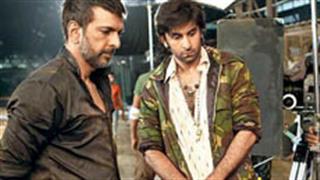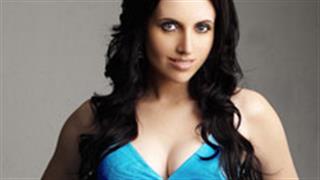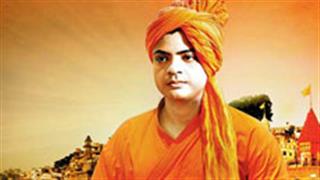Gone are the days when the villain stood for all that was bad and the hero was the epitome of all that is good. In Yeh Jawani Hai Deewani, the utterly self-seeking Bunny (Ranbir Kapoor) comes and goes as he wishes, regardless of how his selfish manoeuvres hurt those around him.
In Policegiri, Deputy Commissioner of Police (DCP) Rudra (Sanjay Dutt) admits proudly that he is both a cop and a goon. `Ek pe ek free, ` (Buy one get one free) he says. It is almost as if Bollywood has subverted the cult of the traditional hero to suit the perverse purposes of present times.

Sanjay Dutt in Policegiri
Interestingly, Dutt is currently in jail, just as he was in 1993 when Khalnaayak, in which he played the psychotic title character, was released. Subhash Ghai, who directed Khalnaayak, says, `The anti-hero has always been loved by the audience. Whether it was Ashok Kumar in Kismet, Sunil Dutt in Mujhe Jeene Do, Shatrughan Singh in my film Kalicharan or Sanjay Dutt in Khalnaayak.`

Lost idealism
This is not the way heroes used to be in our films. They were idealistic and would stand up for the truth, even at the cost of their lives. In Hrishikesh Mukherjee's Satyakam, the idealistic eponymous hero Dharmendra chooses to perish for his principles rather than compromise them.
Forty-four years later, in his latest release Yamla Pagla Deewana 2, Dharmendra plays an imposter who declares his own son impotent to ward off the unwanted attentions of a poor girl. `It's a sign of changing times, ` says Dharmendra.
`Values have changed. If Satyakam was to be made today, the hero would have to be portrayed in a different light. No one would accept a rigidly idealistic hero any more. A more sinister, less noble hero is the need of the hour.`

SRK effect
Filmmaker Sanjay Gupta blames the changing mores on the quality of roles being essayed by top-notch actors.
`The concept of on-screen badness was redefined ever since Mr (Amitabh) Bachchan made the anti-hero so cool in Deewaar, Trishul, Agneepath and Shakti. Sanjay Dutt in Khalnaayak, Shah Rukh Khan in Baazigar and Darr totally nailed the Gabbar Singhs and the Shaakaals of yore.`

Gulshan Grover, who has played the bad man ad nauseam in the past, agrees with Gupta. `This movement of villainy towards heroes started when Shah Rukh Khan accepted the Best Villain's award. Every major hero saw box office potential in crossing over from good to bad.
Later the award was renamed as 'Best Actor In Negative Role'. So villainy was redefined.` He predicts that this will soon be the era of the 'Dirty Hero'. Says Grover, `The hero is now going to become greyer but not a full-on anti-hero like earlier on. It will be more like the Dirty Hero, a male version of what Vidya Balan plays in films such as The Dirty Picture.`
Conflicted men

Neil Nitin Mukesh, who has played both anti-hero and villainous characters, feels that the hero of today and the future `is a man conflicted and divided by the changing morality prevalent in our society`.
Says Mukesh, `When you play a Mogambo or a Gabbar you are comfortably on the wrong side of the line of morality. Nowadays, the conventional villain is extinct.
We have leading men playing grey and black characters. In my new film Shortcut Romeo, my character is a man who takes shortcuts to get rich, yet he has a softer romantic side.

In Saat Khoon Maaf (he played one of the seven husbands of Sussanna), the husband had to be savagely mean to his wife. And the cause for his meanness had to come out in the sequence where I rip off my fake leg. Here the audience realizes that the husband's violent sadistic streak originates from his inadequacy and frustration.`
Anti-heroine
Ghai believes that there is a fine distinction between the villain of yore and the anti-hero today. `The anti-hero is a rebel with a cause, and always appreciated by the audience. And why just the hero? Even the heroine is embracing shades of grey in her personality. Aishwarya Rai in my Taal was pristine. But the heroine in my new film Kanchi is rebellious, defiant and aggressive.`
The anti-heroine is in fact also gaining credence in Hindi cinema. In the new entertaining comedy Fukrey, Richa Chadha plays a gangster named Bholi Punjaban.

Laughs Richa, `I don't know whether being bad is good for my career. I did the role in Fukrey because I loved my character. It was by far the most important female part in Fukrey.` Chadha admits she wouldn't have done it if it wasn't for producers Farhan Akhtar and Ritesh Sidhwani.
`They make classy films and they ensured that my character came out strong but not cheesy. I had played a dramatic emotional role in Gangs Of Wasseypur. I needed to do something more grey and yet enjoyable.`
Vipul Shah has an entirely different take on the debate. Shah, whose film Force brought more applause for the villain Vidyut Jamwal than it did for the hero John Abraham, feels that at the end of the day, a role -- good or bad -- is a role. `Why associate actors' images with characters?

The role has to be performed well. Our cinema needs to grow beyond the actors' images. In the West, the line between villain and hero has blurred. It is only actors playing roles, negative or positive. We need to get there fast.`




















